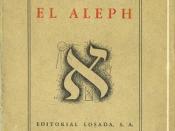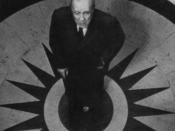The narrator is the teller of a story in a given narrative. Modern literature uses the narrator as the "ÃÂvoice' transmitting the story. A narrator's participation in the story varies depending on the author's choice. In first-person narrative the teller is either involved as a protagonist, participant or witness; the protagonist being the principle character, the observer being a character without any essential function except observation and recording, and the participant falling somewhere between the two. In third-person narrative we are stood outside the events; as an omniscient narrator we are given god like privileges such as infinite knowledge and understanding and can seemingly travel through time and space, accessing un-verbalised thoughts of many characters. The extent of the third-person's omniscience are further complicated through focalisation and point-of-view. Whilst a first-person's point of view is usually restricted to one character's thoughts and partial knowledge, the third-person's knowledge can either be restrictive or omniscient.
The restrictive third-person narrator can be confined to the knowledge of a single or small group of characters, a method known as "ÃÂlimited point of view'.
It is very important that we draw distinction in Borges' choice of narrative because it is through this that we hope to understand his choice of themes. Borges was at a difficult point in his life when he wrote "ÃÂEl Aleph' so many of his stories include autobiographical elements which might affect his narrative. Hopefully by comparing the stories, "ÃÂEl Aleph', "ÃÂEl Zahir', "ÃÂLa escritura del dios' and "ÃÂEmma Zunz', we can make comparisons and contrasts in his narrative and draw some conclusion about the choices he made.
"ÃÂEl Aleph' is a story based on the conflicted relationship between Carlos Argentino Daneri and the character Borges "ÃÂ the narrator.
"La locura de Carlos Argentino me colmÃÂó de maligna felicidad; ÃÂÃÂntimamente, siempre nos habÃÂÃÂamos detestado."à"Carlos Argentino madness filled me with malign happiness; deep down, we had always detested one another."à"ÃÂEl Aleph' has a first person narrative. We are limited to the character, Borges' point of view and partial knowledge. The characters are narrated in a fairly patterned manner; Carlos is most commonly related to using direct speech. Borges however is very rarely quoted and when he is, it is usually in the form of indirect speech. Borges thoughts are described in a completely different way. We are never treated to quotes from Carlos' mind, even directly, but we know everything in Borges' mind, in the indirect. This is in line with the narrator's limited point of view. We know only of Carlos' poetry, speeches and what Borges' thinks of him.
"ÃÂEl Aleph' tries to highlight two ideas; that you cannot know everything about the world and that there can sometimes be too much information.
"Todo lenguaje es un alfabeto de sÃÂÃÂmbolos cuyo ejercicio presupone un pasado que los interlocutores comparten; ÃÂÿcÃÂómo transmitir a los otros el infinito Aleph, que mi temerosa memoria apenas abarca?"à"Every language is an alphabet of symbols the employment of which assumes a past shared by its interlocutors. How can one transmit to others the infinite Aleph, which my timorous can scarcely contain?"ÃÂ





